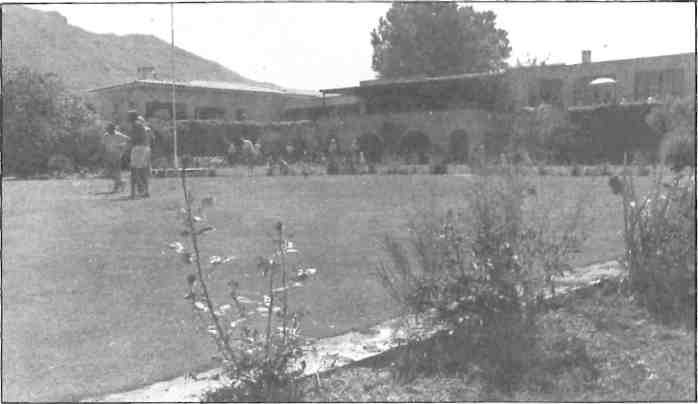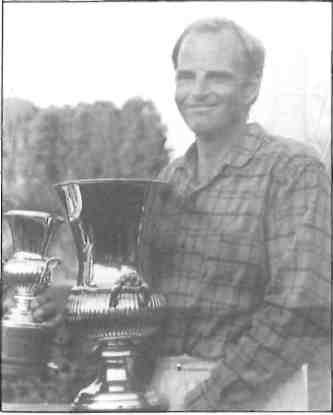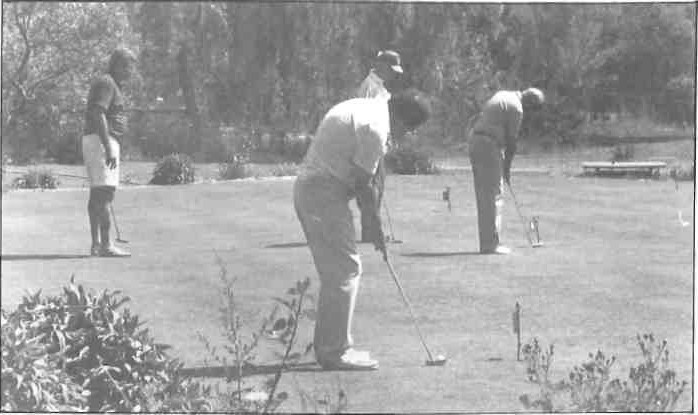The 1989 Greek International Amateur Golf Championship was held this year outside Athens at what must be the most progressive club in Greece, The Corfu Golf and Country Club. Hosting the championship was a coup for this Ionian club whose reputation for sound management and great dedication on the part of all who work there is steadily increasing.

Of the 13 nations which participated, Denmark took the honors with a score of 293 in the Nations Cup, their Axel Krag becoming the Greek Amateur Champion for 1989 by beating Steven Jones of Wales with a score of 291. This was Krag’s first international victory and, at the age of 21, he is a name to be reckoned with in the future.
The individual competitors all made positive comments regarding the excellent condition of the course, and the hospitality shown to them by the club.
The Corfu is primarily a tourist golf club, not particularly a members’ club, and consequently it depends on tourism for its income. Club president Mr Kcdros was sincere in thanking the Greek Golf Federation for allowing the club to host this particular competition.
During the Amateur Championship, Secretary of the Greek Federation, Mr Sarantopoulos, was asked why the federation had broken tradition and held the competition in Corfu instead of in Glyfada. He replied that the Board of Directors had decided to hold the championships every year in a different Greek venue to further promote the three other courses as the Glyfada greens are already well known. Last year there was a last-minute change to Porto Carras in Halkidiki, this year the site was Corfu, and next year the decision is to hold the Championship in Glyfada again. In 1991, if the course is up to it, the venue will be Afandou on Rhodes.
But are four clubs sufficient for Greece? David Crawley, Director of Golf for the Corfu Golf Club, believes more clubs are badly needed if Greece is not to be left behind in the current European golf boom. Statistics have shown that golf is becoming Europe’s fastest growing sport and Greece is in danger of failing to take its fair share of the action. Crawley thinks there should be courses on at least six or seven other islands, and another on Corfu. Set farther up on higher ground where there is ample drainage, it could open up Corfu as a year-round golfing island.

Crawley plans to add on a driving range in 1990 backed by two Ioannina based businessmen. Featuring a bar and restaurant, the range will charge professional tuition, affording subscribers a form of twin membership with the Corfu club.
On the Costa del Sol, 15 more courses are planned for next year, estimated to bring in an expected fifty million dollars to the sport and to allied industries there. Turkey is setting the pace at this end of the Mediterranean by launching million dollar projects, particularly at the Izmir Club, with a further four clubs planned for next year.
If Greece fails to follow Turkey’s lead, it will miss out on the high class tourism that is generated by the sport. Golfers are known to spend up to four times as much on holidays as the average tourist, and the holiday villas and hotels circling the Spanish courses, with their attendant shopping malls, marinas and the high finance brought in by foreign investment indicate the possibilities for Greece. Tournaments sponsored by multinational companies such as Coca-Cola, Barclays and IBM, who sponsored this year’s Championship along with Epirotiki Cruises, Olympic Airways and Marinopoulos, could breathe some life into Greece’s ailing tourist sector.
Mr Kedros’ brother originally predicted that Corfu would become a popular resort. Mr Tsaoussoglou, who owns Tsaoussoglou Tourist Enterprises, which also encompasses the Corfu Hilton, decided therefore to build a golf club on the island and it opened in 1971 with golf pro Mel Pyatt taking the reins.
Mel Pyatt, now head of the Volvo European Professional Golf Tour, did much to promote the club in its early years. He was followed by another pro, Keith Preston, and finally, for the past five years, David Crawley has filled this post.
Crawley was born in Doncaster in 1957 and he has been a P.G.A. qualified professional since he was 16, starting at the Lindrick Golf Club. He then went on to teach Germans at the Killarney Golf Club in Ireland, and spent six years teaching in Belgium before coming to Corfu to take over as general manager.
The club itself is situated along the Ropa Valley at Ermones Bay on the west coast of Corfu, where legend says Odysseus was washed ashore and fell in love with the beautiful Nausicaa who was playing ball on the beach. It is a mere 20 minutes drive from Corfu town and the airport. This par 72 course offers the player much variety with many man-made hazards set within natural surroundings along its 6803-yard length. There are three sets of tees and every hole is situated differently so as to provide ample challenge for those with long handicaps, as well as for scratch players, along the magnificient greens and tree-lined fairways landscaped with lakes and meandering streams. The course is considered among the finest throughout the Mediteranean.

The attractive clubhouse was built from local stone and houses a bar, lounge, modern changing rooms, a restaurant that serves truly appetizing meals and a well-stocked professional shop where all golfing needs may be hired. The club has a large practice ground and, in front of the clubhouse, a putting green. Excellent professional coaches arc on hand at all times to give advice and to ensure that the visitor enjoys all the facilities the club has to offer.
The course compares favorably with those in the ‘rival’ countries of Spain and Portugal, and may be played here 75 percent more cheaply, at 3600 per day or for 19,000 drachmas on a weekly ticket. Special rate memberships are available to foreigners living in Greece and there are package holidays or weekend deals for both tour groups and individuals which may include accomodation at the Corfu Hilton or nearby at the Ermones Beach Hotel.
Normally, the season runs from April to October, but this year it has been decided to extend the season into November and to open by 30 March next year in order to accomodate tour groups coming down from Scandinavia.
Tournaments such as the Corfu Match Play Championship and the Corfu Stroke Play Championship are held regularly every year during May, and there are other competitions scheduled in the fall, these being the Seniors and Veteran Ladies Championships which begin on 25 September; from 9-15 October, the club holds the Corfu Festival of Golf. Entrance fees for these competitions include starting fees and parties and usually there are separate prizes awarded throughout the competition.
If you wish to participate in one of the club tournaments the rule is to book as early as possible. At least 80 percent of all competitors come through repeat bookings as the club is very popular internationally, with Swiss, Germans and British particularly, who have sampled the delights of the club and need little persuasion to return.
The future holds even better prospects. It has been approached by the European tour with a view to holding a professional tournament on Corfu in 1991 including a prize fund in the region of £200,000 that would attract the likes of Seve Ballesteros, Sandy Lyle and other big name players who have failed to play here before. Names like these are needed to put Greece on the golfing map.
The year 1992 will see the introduction of golf as a trial sport in the Olympics and, if the 1996 Olympics are held in Greece, the Corfu club’s owners and manager will certainly be lobbying the Olympic Committee to hold the golf events on Corfu. This is a decided possibility, since the club has not suffered the same maintenance problems as the other three Greek courses.
The club has other attractions besides those fisted. Golfing ornithologists claim this is one of the best places in the Mediterranean to view Greece’s wide variety of birds: indeed the whole area teems with wildlife. And, of course, there are some odd people who may think golf is only part of a holiday on Corfu.







